Kroger would sell 1/3 of Albertsons’ Idaho stores after merger. Meet the billionaire buyer
Thirteen Albertsons supermarkets in Idaho — one in every three in the iconic Boise company’s home state — would be sold to a New Hampshire billionaire’s wholesale grocery business under a sale agreement that Kroger has just disclosed.
The agreement is part of Kroger’s effort to win federal regulators’ approval of the Cincinnati supermarket chain’s planned takeover of Albertsons, a competitor.
Here are nine important points for Idahoans about the latest disclosure.
1. What the chains are — and aren’t — saying about Idaho stores.
The plan announced Friday calls for selling 413 stores from both companies across 17 states and the District of Columbia to C&S Wholesale Grocers, a little-known grocery-supply firm that also oversees two retail supermarket chains in the South, Midwest and Northeast.
Kroger, in a joint news release with Albertsons, declined to say which 13 Idaho Albertsons stores would be sold. Albertsons has 39 stores in the state. Thirteen are in Boise, where Joe Albertson founded the company in 1939 and where the corporate headquarters stands at 250 Parkcenter Blvd.
“Because we are still in the regulatory process, we are not able to share the specific locations included in the agreement,” Tiffany Sanders, corporate affairs manager for Kroger’s Fred Meyer and QFC divisions, told the Idaho Statesman by email Friday after the sale announcement.
Fred Meyer and QFC serve the Pacific Northwest. QFC has no Idaho stores, but Fred Meyer has 11, including three in Boise.
Kroger made two promises: No stores in the nation will close as a direct result of the merger, and “all front-line associates will remain employed.”
The companies’ announcement included a broad summary of store divestitures by state — the summary that mentioned the 13 Idaho Albertsons stores. It made no mention of selling any Fred Meyer stores in Idaho.
An Albertsons spokesperson in Boise did not immediately return a call and an email seeking comment.
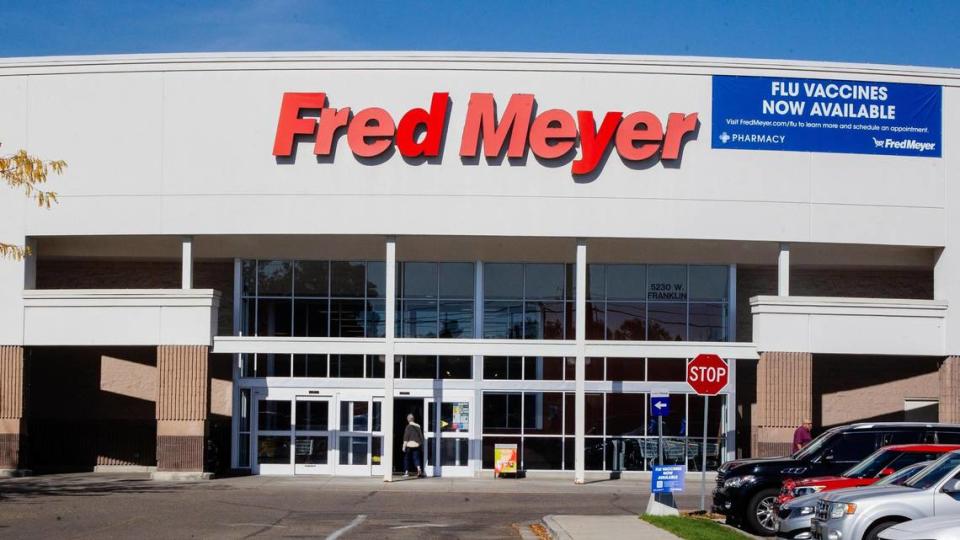
2. Albertsons’ prominence in Idaho may be affected.
The limited disclosure left other questions unanswered, including why some Idaho stores are being sold but not others, whether those stores would be rebranded or retain the Albertsons name, and how Albertsons’ Boise headquarters may be affected.
As the Statesman reported in October, Albertsons is Idaho’s largest company, with $72 billion in yearly sales, about 290,000 employees nationwide and more than 5,000 employees in Idaho. It has 2,272 retail food and drug stores under 24 banners in 34 states, including the 39 stores in Idaho, 24 of which are in Ada and Canyon counties.
Kroger is even bigger. Kroger has 2,750 stores in all and employs nearly half a million people nationwide.
Its Fred Meyer unit, based in Portland, competes directly with Albertsons in the Boise area. Fred Meyer employs more than 2,000 Idahoans and has seven Treasure Valley stores.
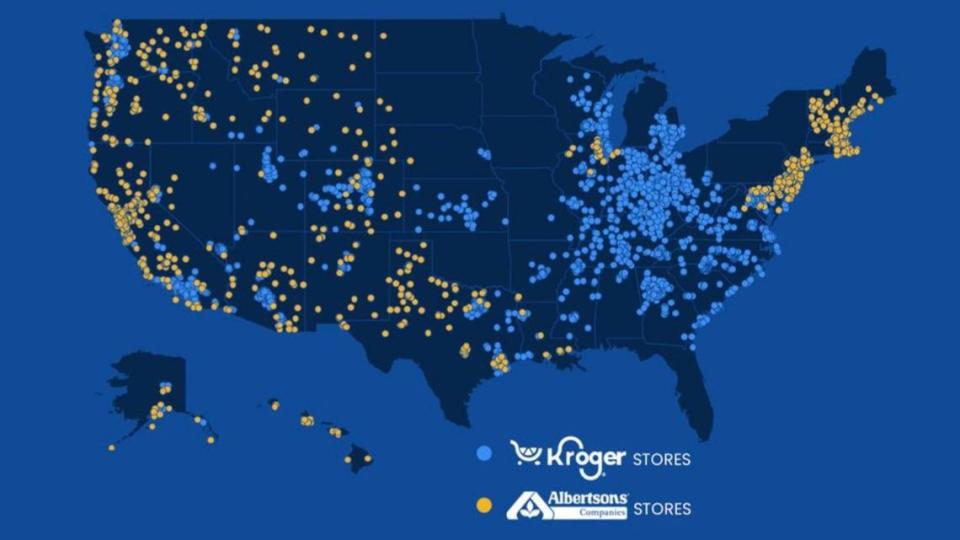
3. It’s a merger — but it’s Kroger calling the shots.
Kroger and Albertsons call the proposed union a merger, though it is Kroger that intends to buy all of Albertsons’ stock and take on all of Albertsons’ debt, and it is Kroger’s chairman and CEO who would run the merged company.
It’s Kroger that would divest the stores after the merger.
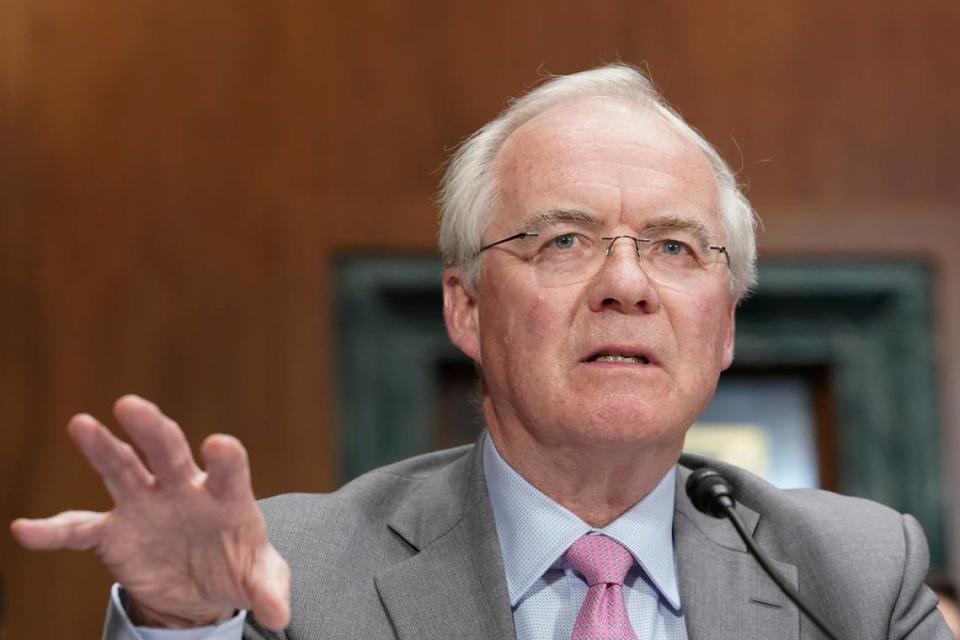
4. Kroger would sell more stores than it had said. Maybe a lot more.
The merger must pass an antitrust review. Anticipating that, the companies said in October that they planned to spin off 100 to 375 stores into a new company to head off Federal Trade Commission concerns about excessive market concentration. Friday’s announcement boosted the number of stores to be unloaded, and it killed the spinoff-company plan, replacing it with a sale to a sole buyer, C&S.
Kroger Chairman and CEO Rodney McMullen argued that the merger and divestitures would sustain competition in the retail grocery sector and benefit communities.
“We embarked on a robust and thoughtful process to identify a well-capitalized buyer who will operate as a fierce competitor and ensure divested stores and their associates will continue serving their communities in the ways they do today,” McMullen said. ”C&S achieves all these objectives.”
C&S would pay $1.9 billion. The purchase price includes eight unspecified distribution centers, two offices and five private-label brands along with the stores.
It’s possible the number of stores sold could grow dramatically. If necessary to secure FTC approval, Kroger said, it may require C&S buy up to 237 additional stores. That’s part of the sale agreement too. It would boost the total to 650 stores, about one in every eight of the two companies’ 5,000-plus stores.
5. Hundreds of other stores would be sold in these 16 states.
The companies have significant overlap in Washington state, Oregon, Nevada, Wyoming, California, Colorado, Alaska and the Washington, D.C., area, the Statesman previously reported.
The state-by-state summary of divestitures suggests that most of the stores Kroger would sell after the merger would come from Albertsons, not Kroger.
The summary says 157 Albertsons-owned stores would be sold in seven states, and just 14 Kroger-owned stores would be sold in one state. An additional 219 stores from both companies would be sold in the three West Coast states — Washington, Oregon and California — but that portion of the list did not say how many would come from which grocer.
Besides the 13 Idaho stores, the summary said the sale to C&S would include:
Washington: 104 Albertsons Cos. and Kroger stores.
Oregon: 49 Albertsons Cos. and Kroger stores.
California: 66 Albertsons Cos. and Kroger stores.
Nevada: 15 Albertsons Cos. stores.
Montana, Utah and Wyoming: 12 Albertsons Cos. stores.
Colorado: 52 Albertsons Cos. stores.
Arizona: 24 Albertsons Cos. stores.
New Mexico: 12 Albertsons Cos. stores.
Alaska: 14 Albertsons Cos. stores.
Texas and Louisiana: 28 Albertsons Cos. stores.
Illinois: 14 Kroger stores.
Maryland, Virginia and District of Columbia: 10 Kroger-owned Harris Teeter stores.
C&S would receive a license to operate stores under the Albertsons banner in California, Colorado, Wyoming and Arizona.
6. C&S is what, again? And who owns it?
C&S was founded in 1918 in Massachusetts as a supplier to independent grocery stores. The C is cofounder Israel Cohen, the S his fellow cofounder, Abraham Siegel.
C&S today is owned by Rick Cohen, of Keene, New Hampshire, who is Israel’s grandson and “the third generation of the Cohen family to lead the company,” according to a bio on C&S’s website.
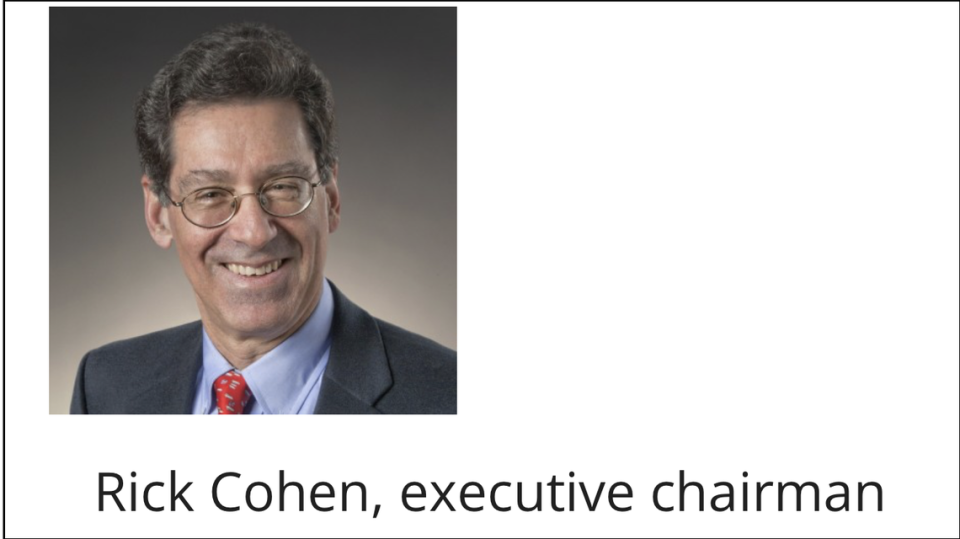
Forbes said C&S has $33 billion in annual revenues, ranking No. 8 in Forbes’ 2022 tally of America’s top privately held companies. In comparison, Boise’s family-owned Simplot Co. ranks 49th with $7.8 billion, the top Idaho firm on the Forbes list.
But Forbes said most of the Cohen family’s real time net worth — which Forbes pegged at $16.2 billion as of Sept. 8, making him the 105th richest person or family in the world that day — “comes from warehouse automation firm Symbotic, which has a partnership with Walmart to automate its 42 regional distribution centers.” Symbotic was founded by Rick Cohen’s grandfather.
Today C&S supplies more than 7,500 independent supermarkets, retail chain stores and military bases, Kroger and Albertsons said.
The company also operates 160 stores, including Grand Union grocery stores in New York and Vermont and Piggly Wiggly franchise and corporate-owned stores in the Midwest and Carolinas.
Said Albertsons CEO Vivek Sankaran: “I have long respected C&S and its leadership team.”
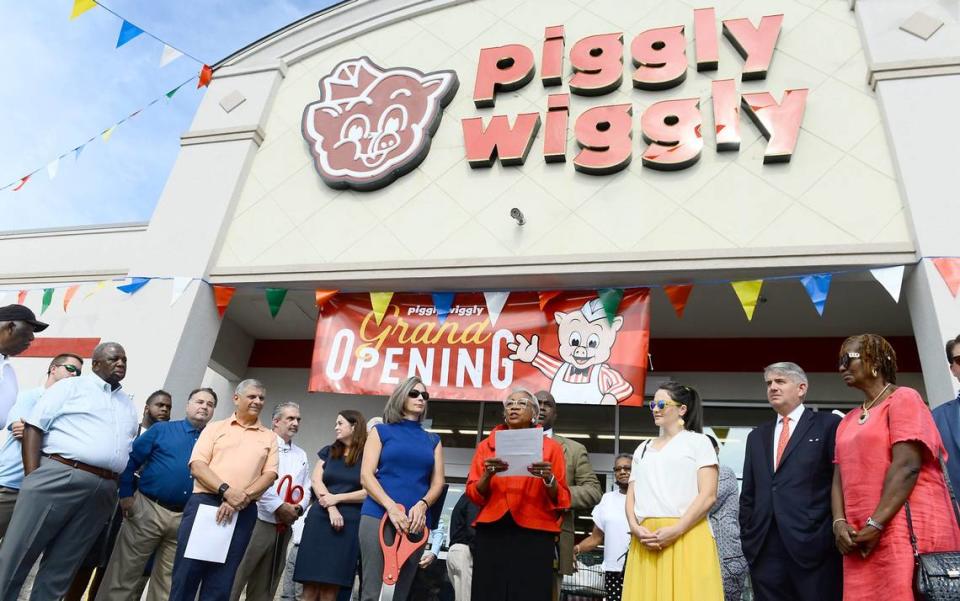
7. Why the companies want to merge.
Kroger is the largest traditional supermarket company in the U.S. Albertsons is the second largest. But pressures on their businesses persists.
“The grocery chains say they must merge to compete with Walmart, Amazon and other major companies that have stepped into the grocery business,” The Associated Press reported. “And there is significant consolidation throughout the grocery sector as companies fight with rising prices for everything from food to workers.”
Kroger’s financial performance recently has been mixed. Its revenues fell to $33.9 billion in the quarter that ended Aug. 12 from $34.6 billion the same quarter in 2022, though sales rose 1.1% when fuel sales are excluded. Its earnings swung from profit to loss because of a $1.4 billion charge to pay for opioid claims.
Albertsons is arguably doing better, with $24.1 billion in revenue in the latest 16-week quarter, up from $23.3 billion the same period in 2022, though its profits fell to 72 cents per share compared with 84 cents a year earlier.
Both companies’ stock prices rose Friday after the news of the divestiture plan and Kroger’s earnings report. Albertsons closed at $23.63 per share, up 63 cents. Kroger closed at $46.94, up $1.41.
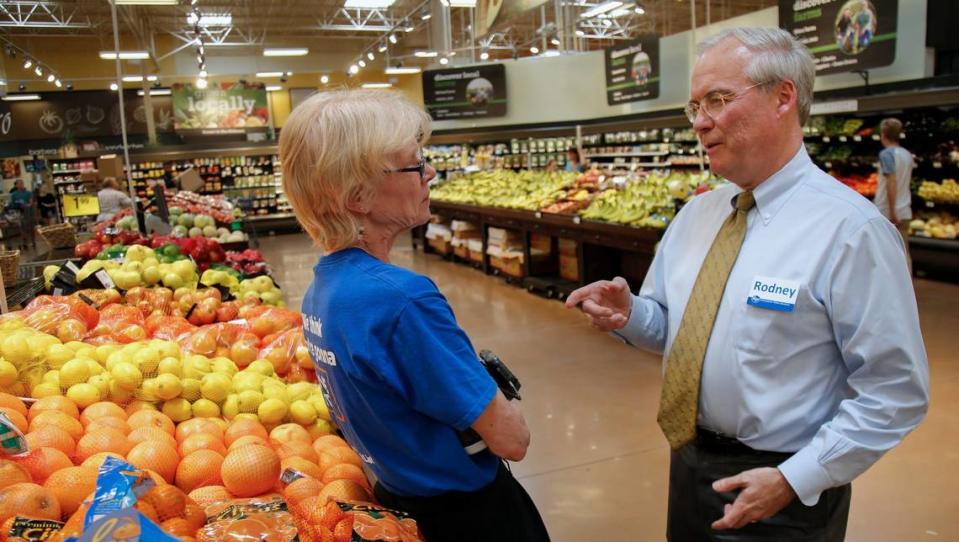
8. When the merger and divestitures may take place.
The companies expect the merger to close in 2024, though they are still awaiting clearance from the FTC.
The sale to C&S would follow.
Some unions and Democratic state officials outside Idaho have called on the government to reject the merger. Senators from both parties expressed concerns at a congressional hearing on the merger in November.
9. Employees worry. The CEOs tell them not to.
Still another unanswered question is how many Idaho employees would be transferred from Albertsons to C&S.
In Friday’s news release, Kroger and Albertsons emphasized the divestitures’ benefits to workers.
“All existing collective bargaining agreements will continue, and associates will continue to receive industry-leading health care and pension benefits alongside bargained-for wages,” the companies said.
As the Statesman reported previously, both companies have heavily unionized workforces, although not in Idaho.
McMullen and Sankaran sought to reassure Kroger and Albertsons employees that C&S would be a good company to work for.
“C&S will offer exciting opportunities for associates to advance their careers, from front-line associates and store leaders to merchants and other professionals,” McMullen said in the release.
Sankaran added, “I echo Rodney’s confidence in the bright future ahead for the associates joining the C&S team.”
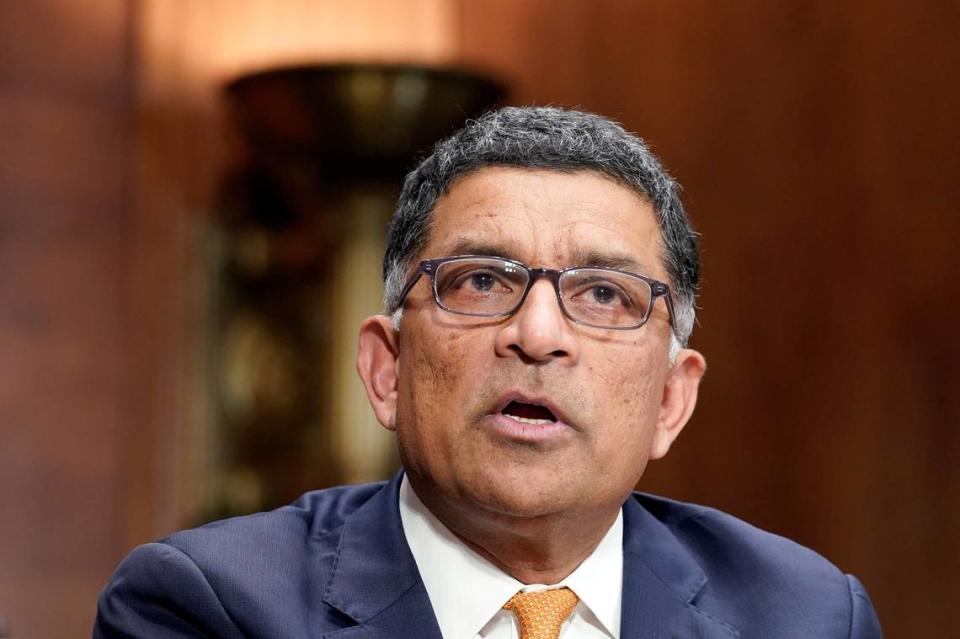
Could merger close Boise stores? Albertsons, Kroger plan to sell hundreds of locations
Sure, you know about Idaho’s potatoes. But do you know about these 5 other farm products?
These apartments are coming to site of popular former Boise shop. And they’re affordable
5 apartment buildings. 2 subdivisions. Starbucks, Dutch Bros, Cafe Zupas. Coming soon

